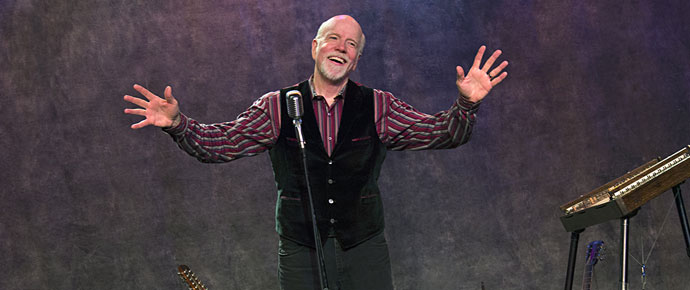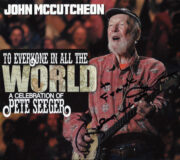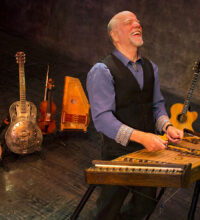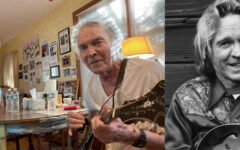
Pete Seeger once said of his friend John McCutcheon, “John is not only one of the best musicians in the USA, but also a great singer, songwriter, and song leader. And not just incidentally, he is committed to helping hard-working people everywhere to organize and push this world in a better direction.”
Those are pretty powerful words coming from a man who was one of the great singers, songwriters, and activists America has ever known. It’s also appropriate that some three decades after the two men met, McCutcheon would choose to honor his late friend on what would have been his 100th birthday with a collection of songs aptly titled To Everyone in all the World — A Celebration of Pete Seeger. A collection of 15 of Seeger’s signature songs, it represents the material that had special significance to McCutcheon.
It’s not the first time McCutcheon has undertaken a project of this sort. In 2012, he did a tribute album marking Woody Guthrie’s 100th birthday. He followed that in 2015 honoring the 100 year anniversary of the death of human rights crusader Joe Hill. “At that time, I asked myself what I would do next,” he recalls. “It then occurred to me that Pete was the third leg in that stool. It felt like I was closing the circle.”
As he says in the liner notes, “This is an album I’ve been waiting over fifty years to make.”
Obviously it inspired others as well. The list of musicians that participate in the recording reads like a who’s who of bluegrass, grassicana and traditionally-oriented artists — among them, members of the bands Hot Rize, Beausoleil, and Steel Wheels along with such exceptional individual talents as Corey Harris, Stuart Duncan, Suzy Boggus among them.
“It’s a pretty easy draw when you say, ‘I’m doing a 100th birthday album for Pete Seeger. Do you want to be a part of it?’ Nobody hemmed or hawed. They all said, ‘Thank you for asking.’ I think Pete would have liked hearing these songs with different arrangements.”
Naturally, McCutcheon also credits Seeger for setting the standard as far as the musicianship was concerned.
“Pete had such a unique style on the banjo,” McCutcheon remarks. “He suddenly took it beyond the world of solely bluegrass and solely ensemble playing to introduce the notion of the banjo as a solo instrument. He also played it as unheard of accompaniment. It was really, really interesting. It was the very ecumenical approach to the instrument that intrigued me. I eventually became a hardboiled student of traditional style, but it was Pete’s playfulness that clustered in my memory.”
While McCutcheon has always been considered a purist, it’s not in a stringent sort of way. Rather it’s because the music he’s made over the course of the past 45 years is inspired by the very essence of what folk music has always meant to a nation coming to grips with its internal strife and inequities. When it was a voice for change and dialogue. When it moved people to action and to affect change for both social and political progress.
“While there’s definitely something there at the core, people misinterpret this kind of description as ‘a protest singer’ and even I don’t want to go to that show,” McCutcheon insists. “It feels so reactive. I think one of the things that marks my work is the range of what I’ve done.”
Or, as The Dallas Morning News once put it, “Calling John McCutcheon as folksinger is like saying Deon Sanders is just a football player.”
“My mother was a social worker and my parents were very socially aware,” McCutcheon recalls. “I remember when I was eleven, my mom made me watch coverage of the March on Washington on television. There were more people there than I had ever seen. It looked like millions of people had gathered on that lawn in Washington D.C. I also noticed the performers who were there that day — Mahalia Jackson, a young Bob Dylan, Joan Baez, Marion Anderson, Peter, Paul and Mary.”
Even at that early age, McCutcheon began to appreciate the essence of folk music tradition and absorb its deeper meaning. “I was astonished,” he remembers. “It was so different from the pop music I had heard up until that point. It was the depth and age that the songs conveyed that attracted me.”
His roots were beginning to be sown. A music instruction book by Woody Guthrie — music of the flannel shirt and work boots variety, he once noted — had him hooked. After graduation from high school, he attended St. John’s University in north central Minnesota, the place where Garrison Keillor launched his hugely popular syndicated radio show, A Prairie Home Companion. When the school allowed him to go on an independent study program to complete his research, he chose to go to meet the musicians that were making the archival sounds that he had been drawn to, so, at Seeger’s suggestion, he went south, hitchhiking to Kentucky carrying his banjo and a backpack. That’s where he met some of his heartland heroes — Roscoe Holcomb, I.D. Stamper, Janette Carter, and Tommy Hunter — whom he learned from firsthand.
After making his way to Knoxville Tennessee, McCutcheon accepted a position as director of arts at Epworth Ministries. By that time, he was fully engrossed in making music of the traditional variety, and his new locale gave him opportunity to perform on weekends in clubs and coffeehouses in the immediate vicinity. “I was a 20 year old kid, so I would say yes to anything,” he recalls. McCutcheon’s musical apprenticeship was well underway.
Even so, he began to appreciate the need for some sort of stability. He moved again, taking a position at Clinch Valley College in Wise, Virginia teaching traditional music. He also recorded his first, aptly-named album How Can I Keep From Singing. “People had started hearing about me, which meant I could play farther afield,” he explains. “I started playing outside the southern region, but I figured if things didn’t go well, I could always return to teaching.”
McCutcheon was eager to change the way the public perceived traditional music, and to define its image apart from the way banjo and bluegrass music was presented in the media. He saw films like Deliverance, parodies like Lil Abner, and television shows such as The Beverly Hillbillies and Hee Haw as vehicles for furthering the stereotypes of old time musicians as, in his words, the stuff of “hay bales and overalls.”
“I was simply using my love of the music and the region and especially the people I’d met to craft the way I present my work,” he recalled. “I simply wanted listeners to fall in love with the music in the same kind of way I did, so, using storytelling, I’d try to create an environment for them to hear the music in a new way. So much of other Appalachian music was presented as campy, or as part of some amusement park approach, I was determined not to do that. To be sure, there were plenty of other people who felt the same way.”
As far as McCutcheon was concerned, the music he was making had already passed the test of time. “Songs are the basis for storytelling and the same can be said in reverse,” McCutcheon points out. “Doing both allowed me to interpret things in a different way. Music, to me, is far more than a collection of words and notes. It comes from someplace and exists in that world. I wanted to help create a little bit of that environment. I’d never really seen anyone do anything quite like that before, so there was lots of experimenting, but the feedback I got convinced me that I was on to something.”
That might have assured a successful career, but the early ‘80s found him expanding his palette. He took up the hammer dulcimer and began pioneering it as an instrument that could be used in a contemporary context. He also became a father, and released Howjadoo, the first in a series of eight children’s albums that aimed to add intelligence and intellect to a style of music he viewed as condescending and uninspired. They garnered him recognition and a dozen of the prestigious Parents Choice Awards. He also became further engaged in the making of music that tapped topics that were both timeless and traditional. His teaching experience in Virginia brought him to the region that the Carter Family was from, and given his extensive musical arsenal — guitar, banjo, dulcimer and eventually fiddle, mandolin and autoharp — he felt a kinship with the Carters and the music that they made.
Little wonder that Johnny Cash, who was as close to the Carters as anyone, described McCutcheon as “The most impressive instrumentalist I’ve ever seen.”
At the same time, his songs became more topical and touched on experiences that made an indelible imprint on history as a whole.
Always the restless visionary, McCutcheon continued to make it his mission to keep traditional music from falling into oblivion. He’s produced a dozen albums spotlighting traditional Appalachian music and the singers and storytellers who carry that music forward. He’s gone from playing colleges, clubs and folk music societies to top billing at fundraisers and leading festivals, the Philadelphia Folk Festival, England’s Cambridge Folk Festival, the National Storytelling Festival, the Bread & Roses Festival and, of course, Pete Seeger’s Clearwater Festival. And it was at those festivals that he frequently crossed paths with Seeger and where the two solidified their friendship.
He later toured with Seeger, as well as John Prine, Richie Havens, Louden Wainwright, Doc Watson, Rosanne Cash, Odetta, Tom Paxton, Arlo Guthrie, Si Kahn, and Nickel Creek, and recorded with Paul Simon, Suzy Boguss, Sam Bush, Cris Williamson, and Kathy Mattea. And yet, he’s never let his accomplishments overshadow his main intents. He also played picket lines in true protest tradition.
That mission also took him around the world. In 1991, he conceived and directed the U.S./U.S.S.R. Friendship Tour spotlighting American and Russian musicians who performed together in a ten week tour of the Soviet Union and the U.S., the first tour to encompass both countries. Over the last several decades McCutcheon has performed all over the world, bringing his arsenal of instruments with him. “Skycaps are my best friends,” he jokes. “I’ve never been the traditional tourist,” he maintains. “I like to absorb the music that I encounter in the places I visit and then document it at the same time. I’ve made music and recorded with Aborigine Australians, with musicians in the Ukraine, Cuba, Madagascar and Nicaragua, where he became Board Chair of a children’s literacy program called Libros Para Ninos. As McCutcheon is quick to point out, “Folk music is the universal language, a dialogue that’s common to every culture.”
McCutcheon’s devotion to preserving traditional music and then passing it forward continues to serve him some fifty years after his parent bought him that first guitar. “Woody Guthrie bore witness to the events that were transpiring around him, and I think that still the music’s mission,” he says. “I write love songs, children’s songs, songs about history, and political satire. What binds it all together are the stories and singular moments that need to be shared and handed down from one generation to another.”
Indeed, recognition of his efforts has been widespread. He was named the first chairmanof the board of the Virginia Organizing Project, made a Fellow of Hereford College at the University of Virginia, asked to serve on the advisory board of the Music Research Center in Charlottesville, Virginia, and had a collection of his music preserved in the American Folklife Center. His many accolades testify to his accomplishments. He ‘s received six Grammy nominations, numerous awards from the American Library Association, an Honorary Doctorate from his alma mater, St. John’s University, an induction into the Central Wisconsin Music Hall of Fame and various distinctions from the many festivals he’s played.
Still, McCutcheon’s success may have been best summed up by a quote from The Washington Post. “He has an uncanny ability to breathe new life into the familiar. His storytelling has the richness of fine literature.”
That’s clearly demonstrated in To Everyone in all the World. Like Seeger himself, McCutcheon makes music that strikes a universal chord. It’s a special synergy made all the more obvious by the new album.
“I remember one of the things my mother said to me was ‘remember, this is not about you, it’s about us,” McCutcheon muses. “‘You can soak all this in and or you can figure out how this can be an empowering thing for everybody that’s a part of this.’ That was a tremendous gift to get very early on. This is all about how you use this precious time, It’s a privilege and it’s a responsibility. So what do you do with it?”
John shared this preview from To Everyone in all the World, his version of Seeger’s Well May The World Go, along with these comments about the track…
“I learned this song in the mid-’70s, just after Pete Seeger wrote it. It’s a frequent show-opener for me, a song, a prayer, one of the most hopeful songs I know. The Hot Rizers and I have been pals for over 30 years, and Tim O’Brien has been on probably most of my 40 albums. I knew I was going to open the Seeger album with this song, and I knew who I wanted to do it with. Stuart Duncan is a fixture on my projects and it was simply too tempting not to include him. Easiest cut I recorded on the album. Probably a first take. Like rolling off the proverbial log…”









